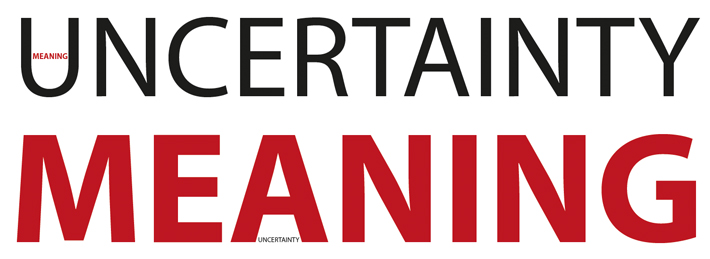The importance of defining meaning in times of uncertainty

What do you say you do for a day job? Program websites? Build widgets? Manage people? Sell things? Deliver stuff? Cook, clean, care, or create?
Do you ever look for meaning behind what you do? Turns out you might if your situation becomes uncertain. Be careful, however, as asking questions about meaning may serve to only increase your uncertainty.
I often quote Jewish philosopher and holocaust survivor Viktor Frankl who stated, “Man’s search for meaning is his primary motivation in life.” Edwin Trevor-Roberts, who did his PhD in the area of career uncertainty, notes that “it is the desire to reduce uncertainty that motivates many human endeavours.”
I see these two statements as complimentary. We are motivated to reduce uncertainty by creating routine and structure. However, if we put in place too much structure, we create bureaucracy and complain about a sense of “meaninglessness”; of being cogs in a machine. We often then see dramatic career changes such as I wrote about with John Lauer as people move into the unknown to satisfy this primary motivation of finding meaning.
It is not surprising that we are inclined to reduce uncertainty given its negative impacts. Uncertainty is linked to increased stress, role ambiguity, job turnover, negative health effects and poor decision making. Uncertainty can lead to poor performance and people often define their meaning and worth through their performance. As such, we can be left searching for meaning in uncertain times.
I raise the notion of searching for meaning with great care, as simply asking the question opens up the risk of discontent for those who may not be searching.
In a frustrating paradox, our search for meaning in itself can exasperate the situation. Trevor-Roberts goes on to state that “it is the search for meaning and purpose within a person’s career that creates uncertainty.” On the one hand, we can look for meaning in uncertain times. On the other hand, we can reduce uncertainty by simply choosing to no longer search for meaning in what we do.
This ties into articles that ask whether trying to be happy makes us unhappy and research that links increased searching for meaning with reduced subjective well-being when the person is unable to find the meaning they search for.
Defining meaning in the workplace
What does this tell us then about the role of the leader to define meaning for those they lead? Our environments are becoming increasingly uncertain, which can impact performance and cause people to search for meaning as a means to mitigate that uncertainty.
There is an article put out by McKinsey and Company which speaks of increasing the “meaning quotient” of work. The piece clearly links performance with what they call “MQ” and outlines key strategies for sharing appropriate narratives in the workplace, giving employees autonomy, and using relevant and meaningful rewards. The article reflects other popular research such as Daniel Pink’s recommendations to allow people opportunities to find and develop autonomy, mastery and purpose.
My curiosity about things such as meaning, vision, purpose and strategy has allowed me to have conversations with executives about why they do what they do and why those who follow them are along for the ride. The majority of the time it is not a consideration. Meaning and purpose are defined by the immediate deliverable and reaction to the present situation. People are left to their own devices to determine what it means to work for the organisation.
Other leaders define meaning in the output of the organisation, saying it is about the technology or the profit. A small percentage say it is about something more than the work of their hands; that meaning transcends the day to day activities.
The McKinsey and Company article places a value judgement on whether you should define meaning for those who follow you. While I agree with the sentiments in the article, I am careful about ascribing my values to what other leaders should or should not do. Everyone is on their own journey and like attracts like.
Three approaches to defining meaning in organisations include:
- If you do not define meaning for your team, especially in times of increased stress and uncertainty, then you can expect to attract and retain people who do not place a high degree of meaning in the work they do or are more focused on finding meaning outside of work.
- If meaning for you is defined by profitability or your actual product, then you can expect to attract people who share that sense of meaning. This scenario can result in incredible commercial outcomes. The risk is when profitability or profit trends downwards, people who define meaning by such things may find that meaning elsewhere.
- If you define meaning as a higher purpose beyond the day to day operations, then you will expect to attract those people who share your vision. This can create great resiliency particularly in times of uncertainty.
How you define meaning requires that everything you are about – your thoughts, words, and actions – reflect your approach. Which of the three approaches you choose will determine whether you attract people who view their position as a job, a career, or a calling.
How do you define meaning for those you lead? Do you find the need for meaning increases in times of uncertainty, or is meaning defined by the need to get through the uncertainty? If these questions have meaning for you, I welcome your thoughts below.

1 thought on “The importance of defining meaning in times of uncertainty”
Comments are closed.